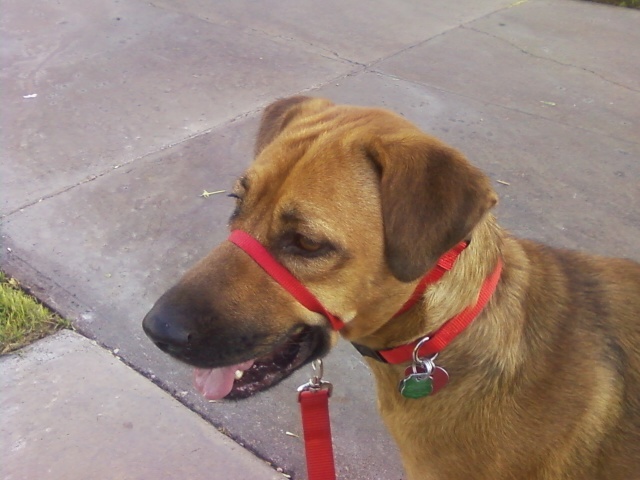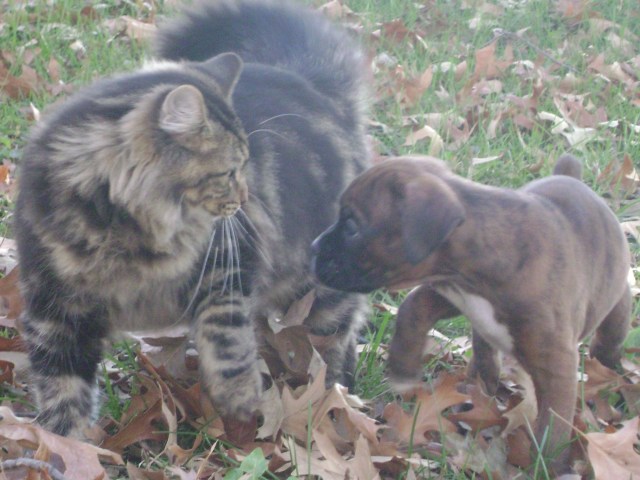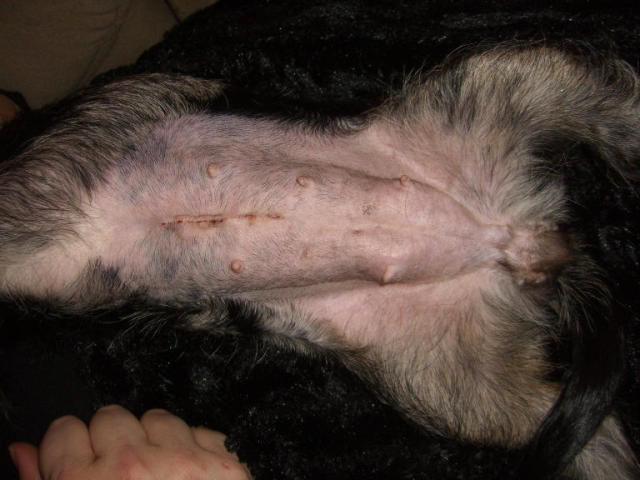QuestionCharlotte,
I have a 7 and a half month old boxer that is very dominant over my wife and kids. He plays too rough with the smaller children by getting on top of them or trying to knock them over. He does show some bite inhibit, but he still doesn't know his own strength and can hurt them by biting. We have always discouraged any biting from him. My wife will try to calm him down, but he does not respect her. He is very respectful to me and listens if I tell him no in a stern voice. I travel frequently though and he thinks he's the boss when I'm gone. What are some things that my wife and kids can do to reestablish their dominance over him? This is a very intelligent dog, but he is also the most hard headed dog I've ever owned. We were told by the trainer that having a boxer is tough without another dog to play with because odds are his energy levels are far greater than we can keep up with. We are now considering this option.
AnswerFirstly I would neuter, always with a dominant dog. This can totally change the attitude of the dog.
The other points to note.
Some basic training
Functional commands include: Sit-Stay, Down-Stay, Stand-Stay, Heel, Let's go, Wait, Come, Corner (in elevators), Go to place, Go to your room (crate), Say hello, Take it (treat or toy), Leave it (anything or anyone you don't want your puppy to approach at that moment), and Drop it.
One especially important exercise to teach a dominant puppy or dog is the Down-Stay, as it will help establish yourself as his leader. In most cases, I recommend teaching the Down command using a lure and reward method. Once your dog knows the command well, should he refuse to comply, gently place him into a down position and praise.
Keep Dominant Dogs Off Furniture
Territories carry great significance to a dog, it must be made clear to him that your furniture belongs to you, which means he shouldn't be allowed on it. This is especially true of your bed.
Your puppy should consider his being allowed up on your sofa or bed a privilege not a right; and only responsive, well-behaved, mild-mannered. dogs should ever be allowed up on furniture, and then only if the owner approves.
Doorways and Thresholds
Pack leaders lead packs ! Literally and figuratively ! Doorways and other thresholds signify territories, which means that if you and your dog both come to a doorway simultaneously, you should enter or exit ahead of your dog. Allowing a dominant dog to dash through ahead of you sends him the wrong message.
Owners of dominant dogs should also prevent their dogs from blocking doorways. Dominant dogs frequently control access-ways (such as doorways) throughout the house by laying across them, and expecting household members to walk around them.
Another significant "territory" is you. If your dog attempts to mount you, or treats you like a human exercise mat when you're sitting or laying down, that doesn't say much for his respect for you. Neither "activity" should be permitted.
Make Sure He Receives Lots Of Outdoor Exercise
A well-exercised dog is a happier, healthier, better-behaved dog. A lack of active physical exercise and stimulation often leads to a hyperactive, destructive, difficult dog. City and suburban dogs who receive insufficient outlets for their energy are usually more needy of constant attention indoors (and therefore may resort to misbehaving to get that attention).
While your dog should not be allowed to show rough or rowdy behavior towards you (or other innocent people), assuming your dog isn't dog-aggressive, he should be allowed to "rough 'n' tumble" with other compatible dogs as long as this rowdy play doesn't overwhelm either dog, or escalate into aggressive behavior.
Hierarchy and Feeding Order
In the world of dogs and wolves, pack leaders eat first. Therefore, it is important that you control the order of who gets fed first.
If you and your dog eat around the same times of day, eat your meal prior to giving him his meal. (Generally speaking adult dogs should be fed two meals a day, while puppies should be fed 3-4 meals a day depending on their age).
Prior to feeding your dog, leash your dog, tell him to sit, fill his food bowl and place his bowl on the floor a few feet in front of him. Have him sit for about 10 to 30 seconds prior to releasing him to eat. This helps strengthen his sit-stay, and reinforces your position as the leader of the pack.
Do not offer him treats and tidbits freely throughout the day as a gesture of affection. Only offer him treats when doing obedience training,food bowl aggression-proofing exercises, house training, or as part of a behavior modification program. In general, treats, praise and enjoyable interactive contact (petting, playing, affection) should be "earned" by teaching your dog what you want (by issuing basic commands such as "Sit" or "Down"), then using both treats and "life rewards" to reinforce desirable behaviors.
If your dog frequently demands your attention by jumping up or pawing at you, have him earn your attention and affection by having him do a brief sit-stay or down-stay first. For example, a sit for a pat (or any pleasant physical contact, positive attention or interaction). This little exchange helps create and maintain a reciprocal relationship. This way your dog is getting the love and affection he craves, but on your terms.
Note: Most dogs enjoy (and certainly deserve) lots of affection and attention. If however, your dog is especially dominant, it's important to note that lots of kissing, doting, petting, whining, and "baby talk", may be inadvertantly signaling to their dominant dog that they too believe that he's king of the household.

 My dog Kiya
Question
Kiya
My new dog Kiya is a 2 yr old German Shep
My dog Kiya
Question
Kiya
My new dog Kiya is a 2 yr old German Shep
 8wk old pup biting
Question
pebbles
hi i wonder if u can help me my
8wk old pup biting
Question
pebbles
hi i wonder if u can help me my
 Puppy wont come!
QuestionCapone & Rascal
QUESTION: Help! &nbs
Puppy wont come!
QuestionCapone & Rascal
QUESTION: Help! &nbs
 Dachshund spay - swollen mammaries
Question
Lilly
Hi Patti,
We took our 10 month old mini
Dachshund spay - swollen mammaries
Question
Lilly
Hi Patti,
We took our 10 month old mini
 What breed is my dog?
Question
Sugar Sugar
I got my dog from an
What breed is my dog?
Question
Sugar Sugar
I got my dog from an